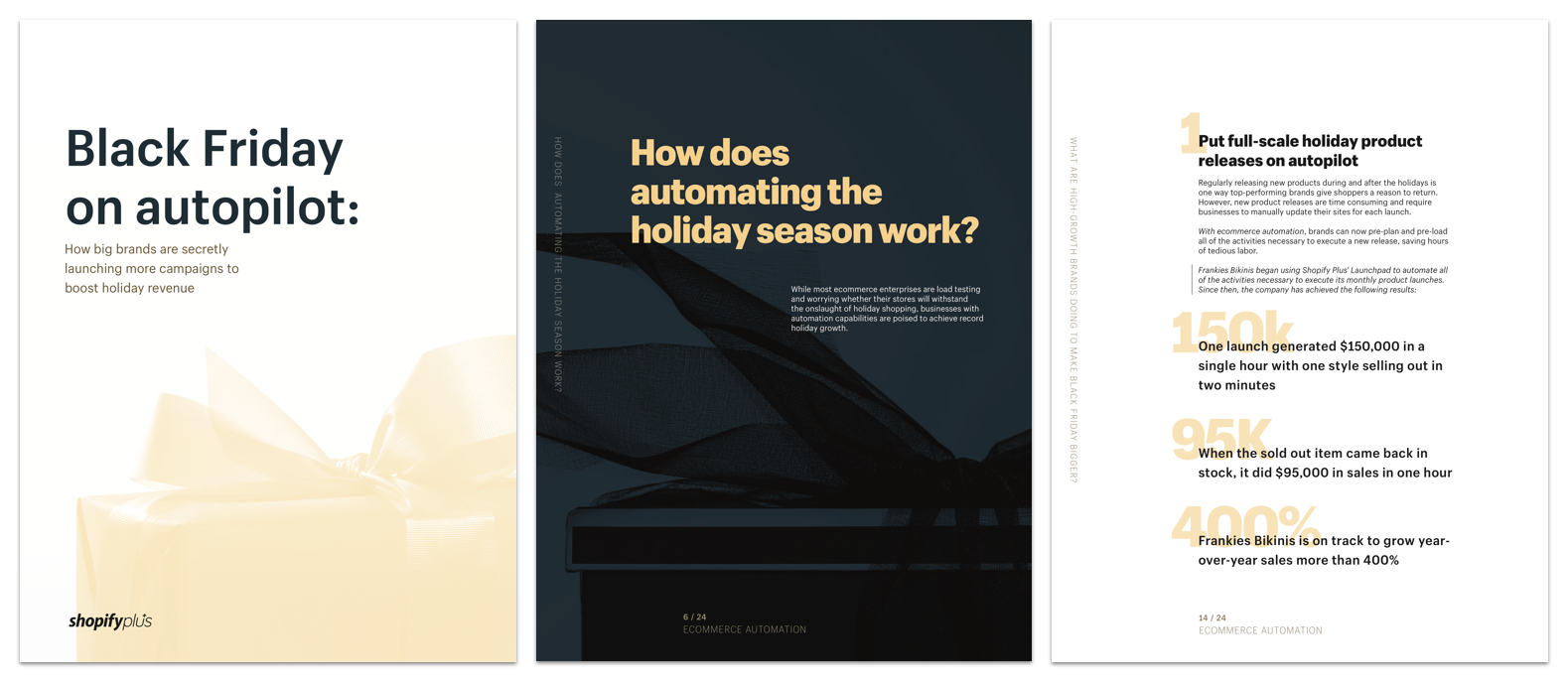Everyone has competing demands on their time.
Especially whenholiday ecommerce marketinghits.
Amidst the frenzy, it’s easy to get consumed with menial tasks that don’t make a real impact on business.
What if you could free yourself from the mundane and menial and make this holiday season your biggest, most profitable, and easiest ever? Now you can …
Automate the holidays
是第一个电子商务自动化sof Shopify流tware that works natively in just a few clicks.
Since its launch, thousands of merchants have already offloaded millions of tasks — not to mention, millions of hours — to grow bigger, faster. Using a three-step visual builder, Flow lets you put repetitive and time-consuming tasks on autopilot. That way, you can make room for growing your business.

If you’re already using Shopify Flow — or just want to take a look at what it can do — we’ve put together …
The top 10 automations to make your holiday season easier and more profitable:
- Personalize by Customer Buying Preferences
- Segment Customers that Converted Quickly
- Track and Reward Your Top Customers
- Discover Customer Insights from Returns
- Send Expedited Shipping Alerts to Logistics Team
- Sell Through Low Stock and Hide Out of Stock
- Reorder Low Stock and Pause Marketing
- Standardize Merchandising for New Products
- Get High-Risk Warnings before Capturing Payment
- Cancel and then Restock High-Risk Orders
Keep reading to start saving time before the rush hits …
Find out how Flow is just one-third of the ecommerce automation trifecta thousands of high-growth brands are using to launch more campaigns this Black Friday, download ourexclusive ebook.
1. Personalize by Customer Buying Preferences
Logging your customers’ preferences before and during your busiest time of the year means, when they come back, they’re automatically provided with a personalized shopping experience.
Personalizedpromotionson a homepage influence 85% of consumers to buy while personalized recommendations at the cart-level influence 92%.
How it works:
- Tags customers based on their latest purchase
- Categorizes customers if items have a specific string in the SKU
- Can also tag based on product name, barcode, or vendor

Here’s what it looks like when a woman shopper logs in and browses the store after their first purchase:
|
|
Here’s a quick reminder onhow to import workflows.
Note: This workflow requires a small theme modification to show special content to tagged customers:
{% if customer.tags = 'men-shopper' %}
This content will only be shown to men shoppers
{% endif %}
{% if customer.tags = 'women-shopper' %}
This content will only be shown to women shoppers
{% endif %}
2. Segment Customers that Converted Quickly
If a first-time customer converts quickly, they’ve shown high interest and intent in your brand. These customers need to be nurtured to encourage repeat orders.
Number one, start tracking these customers to show them targeted, early, or secret Black Friday Cyber Monday sales, etc. Number two, export this customer list as a Facebook custom audience and market to them with specific sales or campaigns
How it works:
- Starts when an order is submitted from a first-time buyer that has converted in less than 3 days from their first visit
- Tags the customer as “high-intent” and adds a customer note

3. Track and Reward Your Top Customers
Easily implement loyalty and retention initiatives by segmenting customers based on lifetime spend or amount of orders.
Now’s the time to reward loyal customers to keep them coming back after the holidays are over.
Saski Collection built a similar workflow that automatically emails it’s customer service team to send a $100 gift voucher to their top customers. Within the first seven days, Saski Collection saw a lift of 40,000+ visits to its website.
How it works:
- Starts once a customer has spent over $500 in your store
- Could also be triggered based on amount of orders or average order value
- Tags customer as “gold VIP” and emails your customer service team to send them a personal thank you, coupon code, gift, or anything you see fit

Email to customer service team:
Subject: New VIP customer: Sally Shopper
Please send personal thank you note template to Lucy Handley - sallyshopper@hotmail.com for placing a recent order for $83.45. They've spent $587.12 with us since becoming a customer.
View order: /admin/orders/541507551284
4. Discover Customer Insights from Returns
A refund is a terrible thing to waste. It’s not just a lost sale … it’s an opportunity to learn what went wrong during the customer experience and improve it in the future. This workflow makes it easier for you to do that.
How it works:
- When a refund is created and it’s greater than $100, Flow will tag the customer as a “high refunder”
- Sends an email to your customer service team with the customer’s name, phone, and email to see why the customer was unhappy with the product(s)

Email to customer service team:
Subject: Contact customer who was refunded $125.25
A refund was just processed for over $100 ($125.25 to be exact). Please contact the customer to see how we can improve our products or service in the future.
Sally Shopper
416-XXX-XXXX
sally.shopper@gmail.com
View order: /admin/orders/541507551284
5. Send Expedited Shipping Alerts to Logistics Team
This one is especially Important for Black Friday and holiday shoppers … because the orders are flying in. Stay on top of high-priority orders with proactive notifications that alert the right team when a rush order comes in.
This workflow can also be adjusted to notify you of orders from your Amazon channel that are Fulfilled by Merchant (FBM), where delays can lead to your account getting shut down.
How it works:
- Starts when the shipping rate on an order includes “next day” or “2 day”
- Emails your logistics team with information about the order
- Tags the order so you can easily sort by urgent orders that are still unfulfilled

The tags make fulfilling and monitoring urgent orders more accurate and less time consuming:

Email to logistics team:
Subject: New next day order - #1901
A new order has just been paid that selected next day shipping at checkout. The order is being shipped to Toronto, Ontario, Canada.
View order: /admin/orders/541507551284
6. Sell Through Low Stock and Hide Out of Stock
Products sell fast over the holidays, and the last thing you want are angry customers who placed an order for a loved one or themselves … only to get told later, it’s not coming.
At the opposite end of the spectrum, scarcity — fear of missing out — is one of the most powerful motivators for action. Especially buying.
Instead of risking angry customers or letting the opportunity to lean on scarcity pass you by, automatically place low-stock products in prominent places on your store to sell through faster.
It’s an extra incentive to buy when customers see we’re running low on a product.
How it works:
- When a product inventory is 10 or less, Flow adds the product to your “clearance” collection and tags the product as “low stock”
- When the product inventory hits 0, the product is automatically unpublished from your online store

You can reference the “low stock” tag on your theme to create an urgency banner on low stock products:

Note: Your theme requires a small modification to add the urgency banner to the low-stock products:
{% if product.tags contains 'low stock' %}
Low stock - only {{selected_variant.inventory_quantity}} left
{% endif %}
7. Reorder Low Stock and Pause Marketing
The previous workflow is great for customers. But what if you or one of your teams need to be notified when a product gets low, so you can order it again before it sells out?
补充库存你需要的确切时间——不是a moment earlier or later. Be transparent about inventory with your whole team and start the reorder process with your vendors.
How it works:
- When a product’s inventory is less than 10, automatically send an email to your vendor or inventory manager to reorder the item
- Flow also sends a Slack message to your #marketing team channel notifying them to pause any marketing campaigns with the product in it

Slack message sent to #marketing channel:
T-Shirt - Red / L is running low on inventory. We have less than 10 in stock.
Consider pausing any campaigns that feature this product so efforts aren’t wasted.
8. Standardize Merchandising for New Products
Automate your merchandising and how products are organized and discovered by your customers, including surfacing the correct items in your store’s search function.
GOOD AMERICAN set up a similar workflow in less than a day that automatically tags denim fits, colors, and sizes so customers can find the exact jeans they’re looking for.
How it works:
- Starts when a product is added to your store and the title includes the word “T-shirt”
- Tags these products within a “t-shirt” and “top” tag, and adds it to specific collections
- Could also organize products based on SKU, variant name (such as color), and much more

On the front end, when customers are discovering and filtering products, they now see consistent tags and accurate results, finding what they need faster.

9. Get High-Risk Warnings before Capturing Payment
No more sifting through hundreds of orders and manually deciding to fulfill low-risk orders. Flow can notify your team when risky orders come through to review and capture payment manually.
Merchants have been saving hours every week without spending time guessing which orders they need to review.
How it works:
- If an order is medium or low risk, Flow will capture payment
- If it is high risk, it will tag the order as “for review” and an email will be sent to your customer service team to review the order
- If all checks out, you can capture the payment manually

Note: You must have yourpayments set to manual capturefor this workflow.
Because of the order tag, you can also easily filter your orders for those that are still unpaid and need to be reviewed.

Email to customer service team:
Subject: Review #1901 before capturing payment
Please review high-risk order #1901 before capturing payment.
View order: /admin/orders/541507551284
10. Cancel and then Restock High-Risk Orders
Orders that are high-risk for chargebacks slow you down. Automatically cancel and restock orders that Shopify determines are high-risk without any manual reviews needed.
How it works:
- Starts when an order risk level is high
- Flow cancels the order, restocks the items, and sends a cancellation and refund notification to the customer
- Also tags the customer as “high risk” for future tracking and notifies you via email of the cancellation

Email to logistics team:
Subject: #1901 canceled due to high risk
Flow has automatically canceled order #1901. The items in the order have been restocked, and the customer was notified through your regular order cancellation/refund email template.
View order: /admin/orders/541507551284
Interested in Discovering More About Automation?
Flow is just one third of the ecommerce automation trifecta thousands of high-growth brands are using to launch more campaigns this Black Friday. Download ourexclusive ebookto learn more.
Read More
- The 4 Words at the Root of All Meaningful Client-Agency Relationships
- Best Ecommerce Tools: 39 Apps to Grow a Multimillion-Dollar Business Online
- A Crisis Communications Plan for Brands
- Microcopy: Near Invisible Text That Converts Visitors to Customers (Even When They Don’t Read It)
- 10 Halloween Marketing Campaigns from Wickedly Profitable Ecommerce Brands
- Why Are You Still Paying Over $1 Million for an Ecommerce Site? The Answer May Shock You
- How to Use a What-if Analysis to Measure the Effects of Your Decisions
- Ecommerce Marketing Strategies: A Comprehensive Guide for Growth
- Multi-Channel Customer Acquisition: 7 Tips from $3.7M+ in Ad Spend
- The Secret Holiday Ecommerce Strategy to More Campaigns & Sales in 2021









